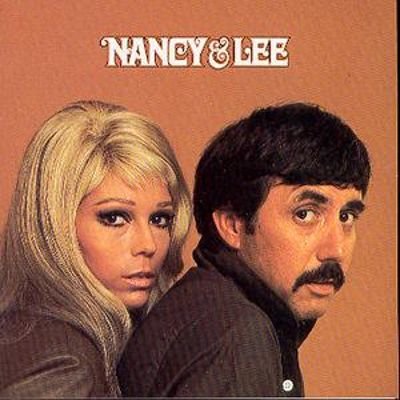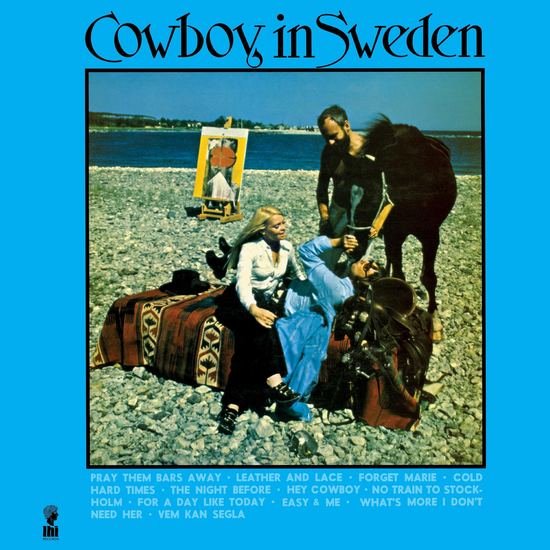Lee Hazlewood is much more than a great moustache and the occasional Nancy Sinatra collaborator. In 1966, Hazlewood wrote and produced the (lady) Sinatra classic, “These Boots are Made for Walking.” He spent most of his career playing off the notoriety of this song, lingering in the shadows and writing country pop songs as catchy as anything on the radio. Still, fame often eluded the singer in a way it eludes many behind-the-scenes songwriters. But Hazlewood had no intention of ever staying behind the scenes. He was a rather prolific songwriter, releasing 18 records from 1963-1973. Not all of these albums are great — in fact, much of his best work came after this period of constant production — but Cowboy in Sweden (1970) is perhaps his best recording — and is out via a reissue by Light in the Attic — and Nancy & Lee is filled with fun covers and sultry originals.
Some time after Hazlewood died in 2007— his last album, released in 2006, was titled Cake or Death — Light in the Attic began excavating his best albums and re-issuing them for wide consumption. The label dove into his work with LHI Industries — a label he founded to release both his own music and the work of others. On November 25th, the label will be re-releasing Cowboy in Sweden, an album that has deserved proper release and reception since its inception. Hazlewood’s impact on modern music — both country and pop — has been immeasurable. His psychedelic tendencies slip into the cracks of Tame Impala’s backwards looking time warp, while his country delivery finds itself in the work of Sturgill Simpson. His vast discography can be tough to crack, so here are 10 Hazlewood albums worth checking out immediately.

Something Special
Hazlewood’s disenchantment with the music industry was no secret. He found labels overbearing and unable to keep promises. Something Special was originally recorded in 1967 but didn’t find a home until it crossed oceans over to Germany 20 years later. It found a permanent American home with Light in the Attic in 2015, along with the two other records from his MGM Trilogy, The Very Special World of Lee Hazlewood (1966) and Its Cause and Cure (1968). The country musician was perhaps an odd fit with MGM Records in the first place, but Something Special’s jazz-leaning instrumentation never found a proper home with the film studio turned record label.

Nancy & Lee Again
Nancy & Lee Again, Hazlewood’s second full-length collaboration with Nancy Sinatra, isn’t quite as intriguing as their first, but its playful nature is a nice introduction into Hazlewood’s softer side. The record was released on RCA Records in 1972, and its formula is simple: huge, orchestral arrangements, with alternating vocals between Hazlewood and Sinatra, his often coming in the form of spoken-word narrations (see opener “Arkansas Coal”). “Back on the Road” is the album’s strongest track, existing somewhere between a Dewey Cox outtake and a lighthearted moment from Johnny Cash. Nancy & Lee Again falls somewhere in between excessive camp and tongue-in-cheek, illustrating how seriously Hazlewood took himself... which is to say, not seriously at all.

The LHI Years: Singles, Nudes, and Backsides (LITA release)
Light in the Attic has done the world a great service in collecting some of Hazlewood’s best sketches and b-sides into a tidy, 17-track collection. The album features some of Hazlewood’s greater moments (the singles: “Hey Cowboy,” “No Train to Stockholm”), but its real gems are the lighter moments where Hazlewood’s demos are stripped of the bombastic horns and over-the-top arrangements he was so keen on. The acoustic version of “If it’s Monday Morning” is breathtaking — Hazlewood’s voice surprisingly deep yet vulnerable. Album closer “I Just Learned to Run” is the perfect finale, a seething, scathing tribute to love lost. Only Lee Hazlewood can make anger sound so sweet.

Requiem for an Almost Lady
Requiem was released in 1971, sandwiched between Cowboy in Sweden (1970) and Nancy & Lee Again (1972). Requiem is a simple affair. Its ten tracks last just over 25 minutes, and the arrangements are uncomplicated in their beauty. Album opener “I’m Glad I Never” features a narrative introduction that serves as a perfect metaphor for Hazlewood’s artistic development: “In the beginning there was nothing, but it was kind of fun to watch nothing grow.”

Nancy & Lee
This album is a near-perfect collaborative affair. From the album cover to the songwriting, Nancy & Lee functions as the middle ground between these two musicians’ individual styles. The album was released in 1968 on Reprise Records — Hazlewood had a tendency to bounce from label to label with each release — and is sexy, silly and everything in between. On “Greenwich Village Folk Song Salesman,” Hazlewood pronounces the New York neighborhood as “Green-wich,” causing Sinatra to laugh on record. “Summer Wine,” clocking in at four minutes and sixteen seconds, is the album’s most interesting track, falling somewhere between '60s Cher and Minnie Riperton. Hazlewood’s influences seep into his music in a chameleonic way; it never feels forced, but more a natural progression from moment to moment and song to song.

Lee Hazlewoodism: Its Cause and Its Cure
This was one of the harder Hazlewood releases to track down until Light in the Attic re-issued it in 2015. It came before Nancy & Lee in 1967, and is a strange amalgam of various genres. There’s a song documenting the rise and fall of a Spanish bullfighter, “Jose,” and a narrated tribal jam that would fit right in on the One Flew Over the Cuckoo’s Nest soundtrack. It’s about finding solace in the night because our days are filled with such tedium and routine. A bit reminiscent of Hazlewood’s escape from behind the scenes to the front of the stage.

A House Safe for Tigers
Another absolute oddity in the world of Hazlewood, A House Safe for Tigers was originally used as a soundtrack for a Swedish semi-documentary Hazlewood created with Torbjörn Axelman. Hazlewood spent much of his time in Sweden in the early '70s, and A House Safe for Tigers is one of seven films he and Axelman made during this brief period. I’ve never seen the film version of A House Safe for Tigers, which speaks to the quality of the soundtrack. It’s one of those scores that can function both on its own and as a supplement to something else.

Trouble is a Lonesome Town
Trouble is Hazlewood’s first record, made in 1963 and released on Mercury Records. The album has seen many iterations, with a re-release on Hazlewood’s LHI Records in 1969 before finding a home with Light in the Attic in 2013. Trouble isn’t necessarily Hazlewood’s purest release, but it's perhaps the best distillation of what he intended to do with his musical career. The songs are witty and charming — somehow both sarcastic and endearing. Hazlewood narrates the record, telling the story of a place called Trouble and the various smalltown folks who inhabit it. Hazlewood’s realization? “Some people are bad all the time. Some people are good all the time. Most of the people are good and bad. Most of the time.” Sounds about right.

The Very Special World of Lee Hazlewood
A very special world, indeed. This record from 1966 is one Hazlewood’s best early releases. Phil Spector’s Wall of Sound technique had proliferated to the furthest reaches of pop recording and Hazlewood’s album didn’t escape unscathed. The strings are layered atop each other, over and over again; the choirs are used sparingly, but when used, steal the show. Album opener “For One Moment” takes every popular recording technique and smashes them together in a track made for a Western-style shootout. The Very Special World of Lee Hazlewood also features a Hazlewood-only rendition of “These Boots are Made for Walkin,” and without the pressures of commercial success, the song’s original songwriter has great fun with it. He introduces the track with, “Here’s a little song about boots and a darling named Nancy.” Hazlewood doesn’t steal the show in the same way Nancy Sinatra does, but that was never his intention; he’s just happy to be along for the ride.

A Cowboy in Sweden
Hazlewood’s best record is another soundtrack, this one accompanying a more biographical story about Lee, who was the cowboy in Sweden. “Hey Cowboy” is Hazlewood’s definitive track, a three-minute saunter with Nancy Sinatra that does every aspect of Hazlewood perfectly. Opener “Pray them Bars Away” is a prison tune, counting down the days until release. “Leather and Lace” is sexed up, displaying a magnetism between Sinatra and Hazlewood rarely captured to this degree. “Cold Hard Times” speaks of those days exactly, but does so against ecstatic strings and an uproarious rhythm section. A Cowboy in Sweden is Hazlewood’s best mishmash, which in turn is the best way to listen to Hazlewood. As he says on “Hey Cowboy,” “I may not look right but I sure do feel fine.” And sound fine, too.
Will Schube is a filmmaker and freelance writer based in Austin, TX. When he's not making movies or writing about music, he's training to become the first NHL player with no professional hockey experience whatsoever.
Related Articles
Join the Club!
Join Now, Starting at $36Pages

Exclusive 15% Off for Teachers, Students, Military members, Healthcare professionals & First Responders - Get Verified!




